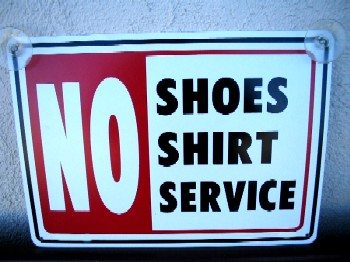Kanika Datta in New Delhi
Has Pantyhose Disappeared From The Workplace? An email bearing this urgent query arrived in my mailbox the day the temperature in New Delhi hit 42 degrees Celsius.
Still, deeply touched at being singled out for such advice among millions of netizens by the PR team of Barbara Pachter, I read it carefully.
Pachter has set out four succinct points explaining when you should or shouldn't wear pantyhose (you don't need to if you are wearing a pantsuit or your legs "are in good condition" apparently but definitely do if they have blemishes).
Then at the end of this list comes the clincher: "Consult your company's dress code. Your company or job may require them."
There were two striking points about this note: one, the sheer banality of the advice and, two, the blanket "consult your company" disclaimer at the end (though I am curious to know which corporate dress code specifies lingerie or inner-wear requirements).
Yet Pachter is no ing nue: she is proprietor of Pachter & Associates, specialists in business etiquette, and author of three books - in fact, the pantyhose advice was a promo for her latest (it is part of 52 tips to boost your career).
She also writes a blog replete with folksy wisdom such as "Use thanks as a closing in your emails" or "Look at what higher-level professionals in your organisation are wearing" (this is part of "dressing for promotions").
...
Will dressing up like boss get you a promotion?
Image: India stumbled on business etiquette in the 90s.It is only natural that her team should now focus on professionals like me in India, now one of the fastest-growing economies in the world (though the fact that I live in the tropics should have alerted them to the uselessness of the advice).
As a branch of communication consultancy, business etiquette has been a flourishing industry for several decades in the West.
It blossomed in the 60s and 70s when corporations started expanding so fast they could no longer restrict their talent requirements to upper-crust university students and men.
So the demand for advice on how to dress and behave in a formal corporate setting grew exponentially and corporations took the initiative in introducing such sessions in their training programmes.
India stumbled on this trend in the 90s for similar reasons and it provided easy bucks for well-heeled housewives offering such advice as how to sit to how to eat and what to say and wear (or not).
There are no estimates of how big this business is, but one such trainer says she receives hundreds of letters of gratitude from former clients, so clearly such advice has value.
...
Will dressing up like boss get you a promotion?
Image: An expert calls etiquette 'grammar of social interaction'.Calling etiquette the "grammar of social interaction", he says, "it helps you get your behaviors in the right order so that others can focus on what you mean, rather than the form of what you are doing."
Then he quotes some ominous statistics from a survey to show that 70 per cent of victims of uncivil behaviour considered leaving the company and 60 per cent said they had less commitment to their job as a result.
This may well be the case but what the Pachters and Hawleys do not account for is plain human nature and changing social mores.
Much email etiquette advice, for instance, suggests that the writer begin with a salutation, end with a sign-off (Pachter suggests "thanks") and to NEVER use all-caps to make a point.
Funny the number of outright rude emails I have received that cordially begin with "Dear Kanika", and end with "Regards" or "Thanks" with no all-caps used at all.
...
Will dressing up like boss get you a promotion?
Image: Business etiquette is a shifting target.And surely there is something dated in suggesting that mobile phones should never be carried into meetings - that defeats the purpose of a mobile.
Indeed, no one expects executives to appear for meetings mobile-less anymore, though it is possible to ask that they stay on silent mode for the duration. And which idiot would take a mobile call when in a meeting with his boss anyway?
Like business strategy, business etiquette is a shifting target as corporate activity grows and diversifies.
For one, globalisation has meant that cultural differences are being bridged by a common and increasingly informal etiquette.
For another, competitive pressures have also loosened the earlier rigid behavioural requirements in the workplace (many executives call their seniors by their first name in American corporations today and fewer of them wear ties).
So etiquette advisors may continue to serve a useful purpose - but they need to keep themselves updated on evolving business cultures and apply some common sense.
For instance, it is worth wondering whether your boss would really promote you if you dressed like him or her. Or wore pantyhose, for that matter.






article